|
|
|
Sort Order |
|
|
|
Items / Page
|
|
|
|
|
|
|
| Srl | Item |
| 1 |
ID:
179853
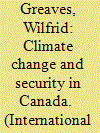

|
|
|
|
|
| Summary/Abstract |
This article examines the implications of human-caused climate change for security in Canada. The first section outlines the current state of climate change, the second discusses climate change impacts on human security in Canada, and the third outlines four other areas of Canada’s national interests threatened by climate change: economic threats; Arctic threats; humanitarian crises at home and abroad; and the threat of domestic conflict. In the conclusion, I argue that climate change has clearly not been successfully “securitized” in Canada, despite the material threats it poses to human and national security, and outline directions for future research.
|
|
|
|
|
|
|
|
|
|
|
|
|
|
|
|
| 2 |
ID:
179854
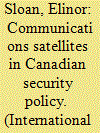

|
|
|
|
|
| Summary/Abstract |
This article traces Canada’s early interest in space, before turning to its late 1960s decision to focus on a domestic, commercial/civilian communications satellite system in geostationary orbit and the subsequent decline in Canada’s military space efforts. It then highlights the wake-up call of the 1991 Gulf War, which demonstrated the critical importance of military communications satellites to future operations, and the steps Canada has taken to gain assured access to such satellites in the decades since. The final section outlines recent advances in low Earth orbit satellite communications (LEO satcom) and the ways in which these systems can address shortfalls in their geostationary cousins. Drawing reference to a new international security environment, it concludes that Canada should move expeditiously to incorporate LEO satcom into efforts to address the growing imperative of military satellite communications in the Canadian Arctic.
|
|
|
|
|
|
|
|
|
|
|
|
|
|
|
|
| 3 |
ID:
179861
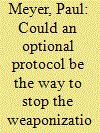

|
|
|
|
|
| Summary/Abstract |
Since the early 1980s, the United Nations General Assembly and its affiliated forum, the Conference on Disarmament in Geneva, has had the Prevention of an Arms Race in Outer Space issue on its agenda. In the intervening years, the threat of weapons being introduced into the outer space realm has waxed and waned, but, in the main, a benign environment free from man-made threats has prevailed, allowing for great strides in the exploration and use of space. Recently, a renewal of great power rivalry including the development of offensive “counter-space” capabilities has resurrected the spectre of armed conflict in space. With widespread political support for the non-weaponization of outer space, has the time come to give legal expression to this goal by means of an optional protocol to the 1967 Outer Space Treaty?
|
|
|
|
|
|
|
|
|
|
|
|
|
|
|
|
| 4 |
ID:
179857
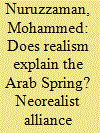

|
|
|
|
|
| Summary/Abstract |
Dominant International Relations theories—realism/neorealism, liberalism/neoliberalism, and constructivism—have so far developed no rigorous theoretical attempts to interpret the Arab Spring, though some marginal efforts have been made to critique the failure of realism to interpret this historical development. This article presents a neorealist interpretation of the Arab Spring focusing on the Syrian civil war, where conflicts between the pro- and anti-status quo forces have unfolded in alignments and counter-alignments centering around rival domestic and external groups. To explain the involvements of rival alliances in the post-2011 Syrian conflict, namely, the United States–Saudi Arabia–Israel alliance and the Russia–Iran–Syria alliance, this analysis employs neorealist theories of alliance formation—the balance of power and balance of threat theories—as articulated by Kenneth Waltz and Stephen Walt, respectively. The dynamics of these formations in Syria lend more support to Walt’s theory that states balance against threats rather than against power. The complex nature and dynamics of the Syrian war, however, calls for refinements of Walt’s balance of threat theory. Accordingly, the article also explores various refinements of Walt’s theory to better explain future complex civil wars involving highly polarized domestic and external parties.
|
|
|
|
|
|
|
|
|
|
|
|
|
|
|
|
| 5 |
ID:
179856
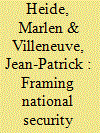

|
|
|
|
|
| Summary/Abstract |
This essay investigates justifications for the “necessity” of official secrecy, by tracing and structuring the rationales underlying it. Justifications will be investigated through the case of “national security secrecy,” a prominent example of official secrecy. While the literature generally treats “national security secrecy” as unidimensional, this analysis demarcates several distinct rationales. Specifically, three justifications for national security secrecy are identified: the logic of crisis demanding the suspension of normal democratic processes (threat frame); the need for enabling and enhancing governance (effectiveness frame); and the delegation to and protection of decision makers (elite governance frame). The paper illustrates possible frictions, overlaps, and synergies between different rationales for national security secrecy, thus broadening the existing conceptualization away from transparency and secrecy as direct opposites. It further contributes to ongoing research on national security secrecy from a frame analysis perspective, thus linking theories, justifications, and practices of secrecy.
|
|
|
|
|
|
|
|
|
|
|
|
|
|
|
|
| 6 |
ID:
179858
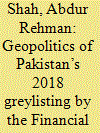

|
|
|
|
|
| Summary/Abstract |
This article argues that, in addition to the valid reasons for Pakistan’s greylisting by the Financial Action Task Force (FATF) in 2018, geopolitical dynamics also played a crucial role behind this development. While the United States (US) under the Trump administration pushed Pakistan to seek an end to “the longest war” in Afghanistan, India, hoping to curb cross-border terrorism, capitalized on this momentum to pressure Pakistan. In order to hastily greylist Pakistan, institutional procedures of the FATF were thus disregarded. The case study demonstrates how economic coercion was used to push Pakistan to accept US and FATF demands. This article argues that Pakistan’s greylisting has created a win-for-all scenario for now. But these gains should not be overrated. Pakistan’s implementation of FATF requirements faces significant structural limitations. Still, the consensus between major actors underscores the potential of the FATF to counter money laundering and financing of terrorism globally.
|
|
|
|
|
|
|
|
|
|
|
|
|
|
|
|
| 7 |
ID:
179855


|
|
|
|
|
| Summary/Abstract |
Global conflicts in 2020 have highlighted the unexpected employment of advanced ballistic missiles and unmanned aerial vehicles by developing military powers. The development of ballistic missiles by Iran, or the export of advanced drones by Turkey, are ultimately the result of the American-led revolution in military affairs that, during the Gulf War, established the potential of precision guided weapons and reconnaissance systems. In response, America’s competitors have adapted their military doctrines and developed weapons designed to both counter and copy the West’s technological advantages. As the Government of Canada implements its defence policy—Strong, Secure, and Engaged—it has promised to procure a ground-based air defence system for the Canadian Armed Forces. Careful consideration and analysis are required, however, to ensure that Canada procures the best possible solution given limited funding and a wide array of potential threats.
|
|
|
|
|
|
|
|
|
|
|
|
|
|
|
|
| 8 |
ID:
179860


|
|
|
|
|
| Summary/Abstract |
This paper frames the contemporary challenge of the People’s Republic of China in the context of Cold War history. It shows how apparent echoes of the past—Beijing's continued embrace of “socialism;” a partnership with Russia that recalls the Sino–Soviet alliance—help illuminate the sources and nature of present-day East–West conflict, and suggests that Francis Fukuyama's much-pilloried “End of History?” has been misunderstood. Viewing the twenty-first-century standoff with Chinese (and Russian) authoritarianism in historical perspective, the paper concludes, casts prospects for the West more positively than recent conventional wisdom would suggest.
|
|
|
|
|
|
|
|
|
|
|
|
|
|
|
|
| 9 |
ID:
179859
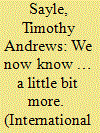

|
|
|
|
|
| Summary/Abstract |
Igor Gouzenko’s defection might have been the first—and most famous—of the Cold War in Canada, but it was hardly the last. Recently opened after Access to Information Act requests made by the Canadian Foreign Intelligence History Project, a number of records cast brighter light on this aspect of Canada’s intelligence history. This article offers an overview of how the Government of Canada established its policy to manage defection and those who defected. It offers a number of possible leads for future research projects, some, but not all, of which, will require the release of further material, whether under the Access to Information Act or a broader declassification framework from the Government of Canada.
|
|
|
|
|
|
|
|
|
|
|
|
|
|
|
|
|
|
|
|
|